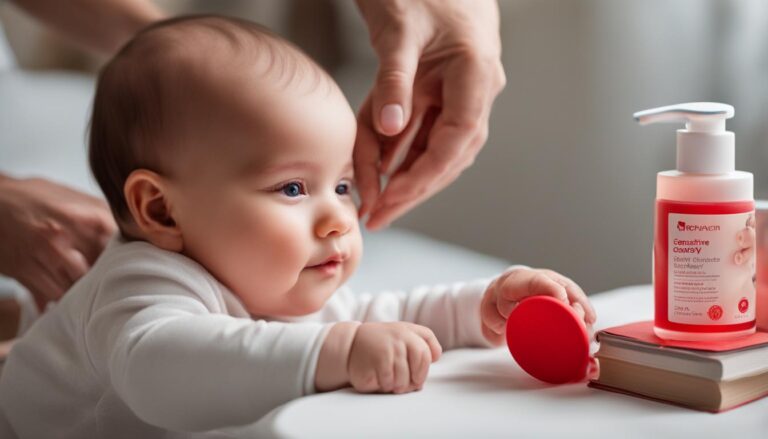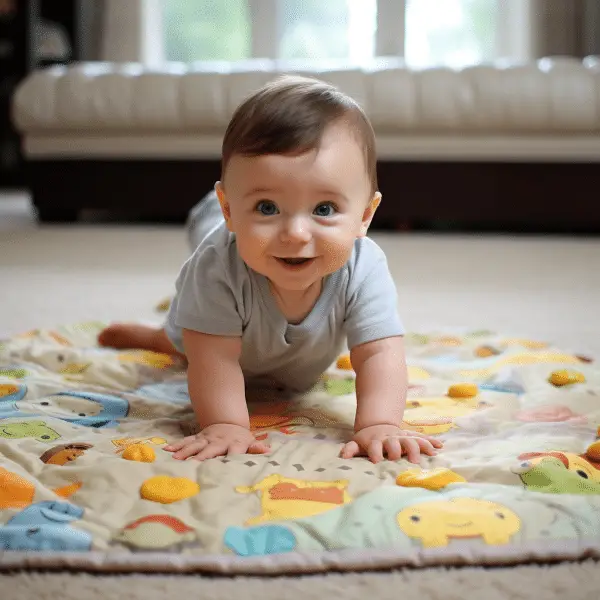10 Essential Newborn Care Tips for First-Time Parents
As a first-time parent, taking care of a newborn can be both exciting and overwhelming. Ensuring the health, safety, and overall well-being of your little one requires knowledge and guidance. Here are 10 essential newborn care tips that every first-time parent should know:
Key Takeaways:
- Breastfeeding the baby on demand and seeking professional advice if the feeding pattern doesn’t change
- Learning how to hold the baby properly to support the head and neck area
- Understanding the baby’s cues for crying and seeking professional advice if the baby cries incessantly
- Establishing a massaging routine for relaxation and bonding
- Dressing the baby in comfortable cotton fabrics
Importance of Breastfeeding and Baby Nutrition
When it comes to newborn care tips, one of the most crucial aspects is breastfeeding and ensuring proper baby nutrition. Breastfeeding provides essential nutrients and antibodies for the baby’s growth and immune system. It is easily digestible and promotes healthy brain development. Additionally, breastfeeding helps establish a strong mother-baby bond, fostering a sense of security and comfort.
“Breast milk is the best nutrition for babies,” emphasizes Dr. Emily Johnson, a renowned pediatrician.
It is full of essential nutrients that support the baby’s growth and protect against infections and diseases. Breast milk is tailor-made for the baby, adapting to their changing nutritional needs.”
To help new mothers with breastfeeding, it is beneficial to consult with a lactation consultant or pediatrician for guidance on proper breastfeeding techniques and overcoming common challenges.
As the baby grows, it becomes necessary to introduce solid foods at the appropriate age. Parents should follow the baby’s readiness cues, such as the ability to sit upright and interest in food. However, it is essential to avoid introducing cow’s milk or honey before the age of one, as it may increase the risk of allergies and infections.
| Benefits of Breastfeeding | Tips for Baby Nutrition |
|---|---|
|
|
For mothers who are unable to directly breastfeed, pumping and storing breast milk can be an alternative. This allows the baby to still benefit from the nutritional value of breast milk, even when the mother is away or unavailable for direct feeding.

Remember, breastfeeding and proper nutrition are vital for the baby’s health and development. By providing breast milk and introducing nutritious foods at the appropriate time, parents can ensure their baby receives the essential nutrients they need for a strong start in life.
Baby Safety and Health
Ensuring the safety and health of your baby is of utmost importance. By taking necessary precautions and following newborn care tips, you can create a safe and nurturing environment for your little one.
Babyproofing Your Home
One of the first steps in ensuring your baby’s safety is babyproofing your home. This involves securing electrical outlets, covering sharp corners, and using safety gates to restrict access to stairs or potentially hazardous areas. It’s important to keep small objects and choking hazards out of reach, as babies tend to explore their surroundings by putting things in their mouths.
Creating a Safe Sleep Environment
Creating a safe sleep environment is crucial for your baby’s well-being. Place your baby on their back to sleep in a crib with a firm mattress and no loose bedding. Avoid placing pillows, blankets, or stuffed animals in the crib, as they can pose suffocation hazards. It’s also important to install smoke detectors and carbon monoxide detectors in your home to ensure the safety of your baby.
Maintaining Hygiene and Health
Keeping your baby clean and healthy is essential. Regularly wash and sanitize baby toys and equipment to prevent the spread of germs. It’s also important to wash your hands before handling your baby to minimize the risk of infection. Schedule regular check-ups with a pediatrician for vaccinations, growth monitoring, and overall health assessments. Familiarize yourself with the signs of common illnesses in babies and seek medical attention when necessary.
By prioritizing baby safety and health, you can provide a secure and nurturing environment for your little one to thrive.

Conclusion
Caring for a newborn can be an overwhelming experience for first-time parents, but with the right knowledge and guidance, it can also be incredibly rewarding. By following these essential newborn care tips, you can ensure the health, safety, and overall well-being of your precious little one.
Remember that seeking professional advice from pediatricians or lactation consultants is always a good idea. They can provide valuable insights and support tailored to your specific situation.
As you embark on this beautiful journey of parenthood, cherish each moment with your newborn. Take the time to bond with them, talk to them, and create a nurturing environment that fosters their development. With love, care, and the right information, you’re well-equipped to provide the best possible care for your baby.
FAQ
How often should I breastfeed my baby?
In the initial phases, babies may need frequent feeding, even every hour. Consult with a pediatrician if the feeding pattern doesn’t change after a few months.
How do I hold my baby in the correct way?
It’s important for first-time parents to learn how to hold the baby properly, supporting the head and neck area.
Why is my baby crying?
Crying is the baby’s way of communication. It could indicate sleepiness, hunger, boredom, or an underlying disease. Seek professional advice if the baby cries incessantly.
How can massaging benefit my baby?
Massaging can help relax the baby, improve sleeping patterns, and create a bond between parent and child.
What type of clothing should my newborn wear?
Newborns should be dressed in comfortable cotton fabrics.
How can I bond with my baby?
Creating a bond through eye contact, skin-to-skin contact, and talking helps the baby become familiar with the parent.
How do I choose the right baby care products?
Select high-quality, chemical-free products for the baby’s hygiene and safety.
How often should I bathe my newborn?
Newborns do not need daily baths, but gentle cleaning of the face, neck, and bottom areas is important.
How frequently should I change my baby’s diapers?
Newborns need fresh diapers to avoid infections and diaper rash.
How can I promote healthy sleep for my baby?
A bedtime routine, such as reading a story and dimming the lights, can help babies sleep better and promote proper development.
Why is breastfeeding important?
Breastfeeding provides essential nutrients and antibodies for the baby’s growth and immune system. It is easily digestible and promotes healthy brain development. Breastfeeding also helps establish a strong mother-baby bond.
How should I introduce solid foods to my baby?
Introduce solid foods at the appropriate age, following the baby’s readiness cues.
What foods should I avoid giving to my baby?
Avoid introducing cow’s milk or honey before the age of one to prevent allergies and infections.
How can I ensure a good milk supply for breastfeeding?
Maintain a balanced diet and stay hydrated for optimal breast milk production. Consider pumping and storing breast milk for times when direct breastfeeding is not possible.
How can I babyproof my house?
Secure electrical outlets, cover sharp corners, use safety gates, keep small objects and choking hazards out of reach, install smoke detectors and carbon monoxide detectors, and keep cleaning products, medications, and other hazardous substances out of the baby’s reach.
How often should I take my baby for check-ups?
Schedule regular check-ups with a pediatrician for vaccinations, growth monitoring, and overall health assessment.
What should I do if my baby gets sick?
Know the signs of common illnesses in babies and seek medical attention when necessary.
What can I expect as a first-time parent?
Taking care of a newborn can be a challenging yet rewarding experience. By following essential newborn care tips, parents can ensure the baby’s health, safety, and overall well-being.
Who should I consult for professional advice?
Remember to seek professional advice from pediatricians or lactation consultants when needed.
How can I make the most of my time with my newborn?
Enjoy the journey of parenthood and cherish each precious moment with your newborn.






